THE F5 MAGAZINE

One woman is murdered every 10 minutes
Kamila Camilo is saving the Amazon


One woman is murdered every 10 minutes
Kamila Camilo is saving the Amazon



AS WE WRAP UP 2024, I WANT TO TAKE A MOMENT TO REFLECT ON THE MISSION THAT DRIVES EVERY STEP, EVERY DECISION, AND EVERY HEARTBEAT AT F5. OUR NORTH STAR IS CLEAR: GENERATIONAL CHANGE FOR WOMEN.
This purpose is the core of our vision, permeating every goal we set, every product we launch, and every conversation we have. It’s our unyielding belief that creating lasting change requires challenging the status quo, transforming systems, and empowering women at every level. And we are just getting started.
When we say “generational change,” we are talking about a vision that goes far beyond today. At F5, we are not interested in surface-level solutions or fleeting trends. We are committed to creating a future where women globally have equal access to opportunities, rights and resources to improve their livelihoods, build thriving businesses and create impact. Next year will herald a new stage of our mission, with some exciting product announcements in the first quarter of 2025. (If you want to make sure you don’t miss out on being the first to hear these announcements, sign up to our mailing list here)
We are here to inspire and empower women around the world to build an unshakeable foundation for future generations. To do this, we recognise the importance of shifting capital flows to ensure that more women receive catalytic funding events. We are not merely redirecting funds; we are redefining access to capital and creating pathways that transform entire ecosystems. Because the truth is, when women succeed, everyone benefits: families, communities, and entire economies.
Our work also means confronting issues that others hesitate to address. Some issues affecting women today are hushed, buried in cultural norms or longstanding inequalities. But can we truly claim to be creating generational change if, in some regions, women are denied their right to speak, to access education, to receive an inheritance, or to open a bank account without a male guardian? And what about the pervasive, insidious violence that so many women face within their own communities, in their workplaces, or even at home? These barriers are deeply entrenched, but they are not immovable. At F5, we are committed to shining a light on these issues, amplifying voices that have been silenced, and advocating for the change that is so urgently needed. We are privileged to have Chantelle Stratford PSM write a piece for this issue of The F5 Magazine on the catastrophic truth of gender violence in Australia.
We are patient, knowing that real, meaningful change takes time. Yet we are relentless, because every small step matters. Our approach at F5 is meticulous, and every initiative we take on, every product we develop, and every partnership we form serves a greater purpose, moving us closer to our ultimate goal: generational change for women. This is not a mission we take lightly. It’s a marathon, not a sprint, and we are prepared to see it through.
The question I hear most often is, “How can I help? How can I support this mission?” My answer to you is this: The time to act is now. 2025 is shaping up to be a pivotal year for F5.
We are on the cusp of transformative launches, groundbreaking projects, and impactful partnerships. We are building something monumental, and we want you to be a part of it.
I invite you to join us on this journey, to be bold, and to step into a global movement for real, tangible change. This is not another “talk-fest.” We don’t need more conferences, events and conversations that end in applause but lack action. At F5, we believe in action because action leads to impact. We are putting in the work, building the pathways, and setting the foundation for a world where gender equity is no longer a distant goal but a reality.
So, as we look forward to 2025, I ask you to walk this path with us. Be part of a movement that is rewriting the future for women everywhere. How can you do this? Follow us on LinkedIn and Instragram, bookmark our website and join our mailing list. Together, we are not just hoping for change; we are making it happen.
Thank you for your support, your courage, and your belief in what we are building at F5. Let’s make 2025 a year of progress, empowerment, and unstoppable momentum toward a future where generational change for women is not just a vision - it’s our reality.
With unwavering resolve,

Tracey Warren, CEO, F5

Using Ailton Krenak words, I want to delay the end of the world, so future generations find a way that is more sustainable to live.”
Kamila Camilo, Social Entrepreneur, Brazilian Activist
Kamila was almost 20-years-old before she set a sneakered foot on a beach or saw the ocean in her native Brazil.

KAMILA CAMILO
“I grew up in a very clean bubble in a Favela on the outskirts of São Paulo. My mother was always cleaning, and I was never allowed to play outside,” Kamila shares.
Both her grandmothers, however, were connected to nature, growing their own herbs for teas, salves, and holistic medicines.
“30 years ago, medicine wasn’t available to people of color even with Brazil’s universal healthcare system. My grandmothers had that ancestral knowledge but that was the closest to nature I could get — going to grandma’s backyard.”
Then at 19, Kamila went with friends to the beach for the first time and saw the sea. Although just one hour from her house, she had never experienced the smell of the ocean, the sound of waves, or sun shining on the water. Kamila was profoundly moved by it all, but…
“I was still wearing my sneakers. Everyone laughed at me, but I thought if I walked barefoot on the sand, I’d get sick,” Kamila reveals. “Then my friends said that pollution came from people, and if we don’t bring trash to the beach, it will be safe.”
That experience stuck with her as she started work at São Paulo City Hall on Fab Labs Livre SP in 2017. The Fab Labs concept originated at MIT and when the mayor of São Paulo visited the campus in 2016, he was so taken by the creator spaces that he decided everyone in Brazil should have free access to such programs; building 12 throughout the country. Shortly after, Kamila Camilo met Kamila Brito from the Amazon state Pará, who created a project called Barco Hacker, river boat excursions for makers, engineers, architects, and others to teach technology to local kids. Intrigued, she volunteered to go.
“It was one of those trips,” Kamila explains, “where your body comes back, but your heart doesn’t.”
For the first time, she fully understood the human impact on the land and volunteered for every trip she could. In 2020, COVID hit, and Kamila’s friend Kamila Brito was diagnosed with stage 4 cancer, passing away soon after. The work she started to build a community of support across Brazil inspired Kamila. During the pandemic, Kamil continued volunteering by collecting and distributing food and cleaning supplies in the outskirts of São Paulo, her hometown. However, she felt the need to go beyond isolated projects— making the world a better place was her life’s purpose. With this in mind, she left her job to become a social entrepreneur. She joined a consultancy that was just starting, and the mission was to bring the impact sector closer to these corporations, including addressing environmental issues.
As quarantine ended, Kamila had the opportunity to attend COP26 (26th UN Climate Change Conference of the Parties — COP26) in Glasgow, the first COP after the pandemic. She had no idea how climate spaces or policies worked, had never been out of Brazil, was just learning English, and —
“You know when you have this feeling you need to go, you don’t know why but you have to? That’s what it was for me.”
Kamila continues, “I was serving communities affected by the decisions being made in these spaces and they were not being represented. I felt I could be the bridge.”
Upon arriving, Kamila noticed that while the side events were easy to get into, the real climate discussions, negotiations, and advocacy forums were restricted. She gained access from a surprising and well-connected source — youth activists.
“I was sharing a house with 11 or 12 kids, and they knew everything — how to navigate the conference, the important decision makers to talk to. They were organizing and leading the climate strike protest. Never in my journey as an activist was I as organized as they. I was very impressed and thought, ‘We need to do that. How can we mobilize more?’”
On the last day of the conference, Kamila and a friend talked about how to get more visibility to the issues in Brazil. The friend — a content creator — had never been to the Amazon and that’s when it hit Kamila: What if she brought other influencers to the forest? Just like her friend before her, Kamila wanted to put them on a boat and take them to the communities to see the villages, hear their stories, and build allies. They found an investor willing to test out the idea and in 2022, Kamila hosted the first trip down the Amazon with 50 content creators.
Now in 2024, they have reached over 10 million people with organic online content. These influencers now travel to conferences and climate spaces, becoming a platform for Amazon stories and bridging the gap between social investors and local communities. Invited to enter Davos for the first time in 2022, Kamila discovered herself talking to power from a place of purpose.
“I don’t have money. Everything I have are the stories I share. I decided that now that I had a bit of access to those people, I might be able to be the voice in their heads. I don’t know if we’ll change their hearts but at least we can talk consciousness to them.”
Gathering and sharing stories that reflect the depth of meaning of the Amazon’s ecosystems to its people are Kamila’s most powerful tools. One has opened vast and life-changing doors.
Roberto lives on the Amazon in Tumbira Village. Unable to attend school, he was cutting trees illegally by age 8 to feed his family. A tourism project was coming to the community in 2018, and Roberto didn’t believe it would do any good, continuing illegal cutting in secret. When the project kicked off, he challenged the Sustainable Amazon Foundation:
“You can work in my community, but you need to start a school here. Kids need access to education.”
This was a game changer for the community. Attending school showed the kids — especially the girls — anything was possible. As tourism grew, Roberto became a valuable source of information and insight, getting paid to share his stories. When he received more money for one day of talking to tourists than he did for one day of cutting trees, he was awestruck.
Sitting on a tree in the middle of the woods with Kamila and one of her trek groups, Roberto cried as he marveled, “I’m here doing what I love, which is talking to people and I get paid for that. I don’t cut a tree, I invite people to see the tree, and they pay me more than the tree that I was cutting. This is just amazing.”
His revelation brought all to tears, connected by the power of his story. This was in 2022 with her first group of the Creators Academy, the platform she established to connect “content producers to Brazilian biomes.” Determined to get the story to every Brazilian, Kamila contacted television presenter Luciano Huck, whose Sunday afternoon show


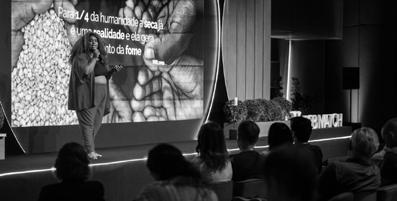
reaches 40 million people every weekend.Luciano went to Tumbira and recorded a 15-minute program with Roberto that became the top story on open television in Brazil. It gained enough attention that in 2023, Kamila and Luciano flew Roberto — who had never been on a plane — to New York to present his story to the United Nations.
They also visited Patagonia, showing him the relationship between the glaciers and the Amazon, broadening his mind to the connection between the different ecosystems and the indigenous people who rely on them. This firmly established Roberto as a valued ally and representative of his community. Since that trip, celebrities have traveled to Tumbira to learn more about Roberto and his community. Tourism is growing and creating more jobs and opportunities, shining a light on the Amazon, its people, and the challenges the ecosystems face.
“How can we bring regular stories to huge stages that can inspire other people? We became story hunters. We’re trying to build bridges with TV shows and huge internet channels that can also share the stories. The business there is growing year after year, so we understand we have a potential with each community we visit to bring more public attention,” Kamila explains. Then with a smile, she says, “This is my best story ever.”
Since returning from her first trek with the other Kamila, this Kamila has been tireless in her work for the environment and indigenous people and people of color. She is involved with two climatebased think tanks (Talanoa Institute and Igarape Institute), works with the Arredondar Exchange
(a Brazil-based POS round-up option for local/ ground-up organizations), and volunteers with Anjos de Cidade (Angels of the City), a 35 yearold organization devoted to returning dignity to São Paulo’s homeless. With such an expense of energy to inspire and motivate others, one wonders what boosts Kamila to keep going.
Biodiversity is the result of symbiotic work between humans and nature. One cannot flourish without the support of the other. When mankind is at its best, we create ecosystems that nourish us and we, in turn, enhance nature. That knowledge energizes Kamila, making her feel that by getting up each day, it is another chance to keep these places alive and thriving.
“Other generations to come need to experience things like swimming with the coral reef in the Red Sea,” Kamila says. “I was there this year and there wasn’t much left. If we’re losing ecosystems today and we don’t do the work now, we are stalling futures — not ours, but theirs.”
This is what keeps Kamila going, pushing her into a lifetime of work not only for Brazil, but all of humanity.
“I know we may not solve all the problems in our time, but as Ailton Krenak said, ‘We need to have ideas to postpone the end of the world.’” Kamila continues, “I want to delay the end of the world so future generations find a way that is more sustainable to live. More than that — find a way back. This is the vision. Gain time for future generations and restore ecosystems for everybody.”
Byline: Linda Morris
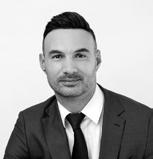
ALLYSHIP - LEVENT SHEVKI
F5 founding partner Levent Shevki, CEO of Cornwalls, discusses the importance of mindset and mentoring in bridging the gender gap
I’ve had the privilege of mentoring women across different professional journeys – from law graduates as a formal supervisor under the legal profession program to innovative female entrepreneurs as a venture capital founder. I currently mentor more than 10 women and in my experience, there is one key factor in both professional and personal success but, more importantly, bridging the gender gap…mindset.
The women I mentor already have everything needed to be successful in terms of skills, abilities and experiences. What I’ve witnessed is it’s not a skills gap that holds women back, instead it’s mindset, driven by external factors. Implicit bias and stereotypes challenge women’s credibility and limit opportunities for advancement. This leads to lack of access to capital, the right networks, the right opportunities, the lack of support and flexibility when it comes to caregiving responsibilities. When this is overcome, women thrive! I’ve seen it first-hand.

better equipped to tackle challenges and seize opportunities. Encouraging a growth mindset helps women overcome internal barriers like self-doubt, and fear of failure, which are often exacerbated by societal pressures and systemic biases. This shift in mindset can transform how women perceive themselves, fostering confidence, ambition, and the courage to pursue leadership roles, negotiate for equitable compensation, and challenge gender norms.
So how do you unlock a growth mindset?
“IT’S NOT A SKILLS GAP, IT’S MINDSET”
Mindset empowers women to overcome these barriers, realise their potential, and succeed in environments that have historically favoured men. Mindset is foundational. When women cultivate a growth mindset (that abilities can be developed through hard work, resilience, and learning) they are
Our mind is the most powerful tool we possess. My own mentors have taught me that achieving a life of bliss is about having the right experiences. In order to have the right experiences we need to make the right decisions. To make the right decisions, we need to have the right thoughts. We have the right thoughts when we have a settled mind and are calm and aware of what’s happening around us. It’s not always easy to be calm or AWARE. For me, it’s about achieving consciousness and being “connected”. This is a big reason I meditate; it helps me achieve that level.
Consciousness allows us to see beyond surface-level reactions and engage with greater clarity and intention. It heightens our awareness and enables us to see things for what they really are
LEVENT’S NUMBER ONE PIECE OF ADVICE FOR WOMEN STRUGGLING TO TAKE THEIR CAREER OR BUSINESS TO THE
I think the best advice is to reconnect with your “why”— the purpose, vision, or passion that led her to pursue this path in the first place. When challenges arise, grounding yourself in your deeper motivations can reignite your drive, offer clarity, and help you navigate obstacles with renewed focus and energy.

(free of outside influence) enabling thoughtful, deliberate action. For me, this fosters authenticity and resilience, we gain insights into our beliefs, motivations, and emotions. We are able to make choices that align with our true values, based on what is really happening around us.
Consciousness also enhances our ability to connect with others, strengthening our empathy and building meaningful relationships. The clarity it brings allows us to tap into our inner wisdom and creativity, as it unlocks innovative thinking, intuition, and the ability to be in a state of flow – for me it’s about chasing that blissful state, everything flows in your direction with minimal effort. I bang on about this to anyone that listens becauseI’ve experienced its power.
Ultimately: settled mind, right thoughts, right decisions, right experiences, in personal and business life.
For me, mentoring is about helping to facilitate this growth mindset as well as imparting experience, opening doors, opening networks, encouraging, challenging, motivating and having a champion out there telling the world about how great you are. The majority of the time I am just reminding mentees about what they already know. We all need to be challenged, reminded of what’s important and what we can achieve. For the women I
mentor, I try to be all of these things, and I step up whenever a systemic gender barrier gets in the way!
Mentoring provides crucial support, guidance, and access to networks which can fasttrack progress. Effective mentors offer not only career advice but also serve as role models who demonstrate what is possible, showing women that they, too, can thrive at the highest levels of business and leadership. Mentors can help women navigate workplace dynamics, advocate for their advancement, and provide the constructive feedback needed to grow and excel. Moreover, mentoring relationships often empower women to identify and capitalise on their strengths, build resilience, and develop strategies to break through barriers that might otherwise hold them back.
TOGETHER CREATE A POWERFUL SYNERGY, WHICH I BELIEVE CAN ACCELERATE EFFORTS TO CLOSE THE GENDER GAP.
Byline: Levent Shevki
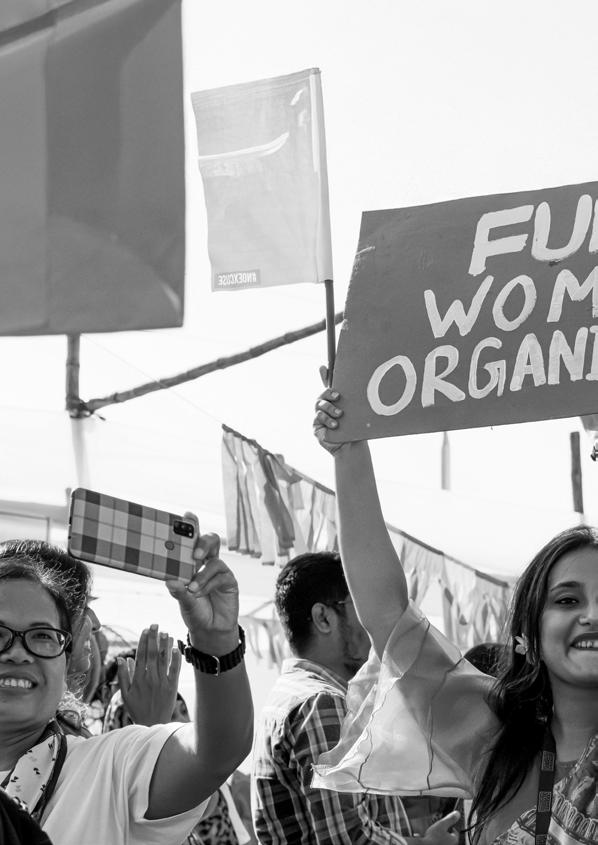
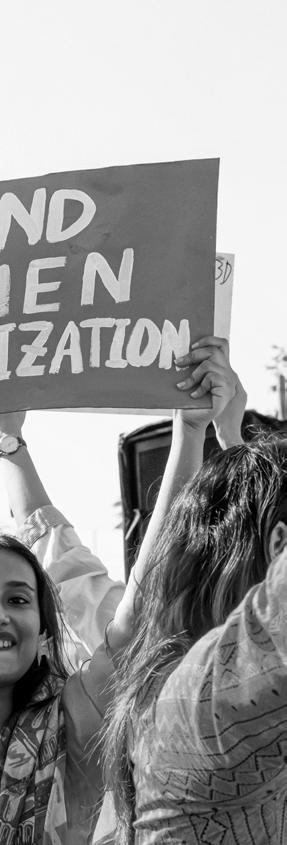
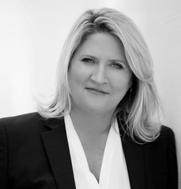
Upon meeting Simone Clarke, one quickly recognizes the power of “positivity.” The CEO of UN Women Australia exudes hope and belief that prompts sustainable action.
“I’m kind of 120% or nothing at all,” Simone explains, “and I think that passion for trying to have an impact and a purpose that is positive — whether it’s at work or with my family — are just part of who I am; part of who I’ve evolved to be.”
Born in Fiji where her engineer father led a vital roads project, Simone grew up in a boisterous, outspoken family raised with an innate sense of fairness. While that colours her entire life, what led the then mom of two young kids to “for purpose” work was an advert for a job with UNICEF
“I studied journalism and communications, and a role as Communications Manager for UNICEF came up. Higher level positions for women were unheard of and part time management roles were even fewer. When I saw it advertised, I thought, ‘Wow, interesting.’”
Starting as Communications Manager for UNICEF, Simone spent the next 20+ years working on behalf of the most vulnerable — women, children, and animals — and in support of global DEI and ESG programs. Since becoming CEO of UN Women Australia in 2021, she has pushed for systemic change in gender equality. UN Women seeks to accomplish Sustainable Development Goal 5 (SDG5) by its 2030 deadline: no small task. SDG5 is one of the 17 SDGs the United Nations established in 2012 at the UN Conference of Sustainable Development in Rio de Janeiro. They are, as Simone points out, “big audacious goals for us to work
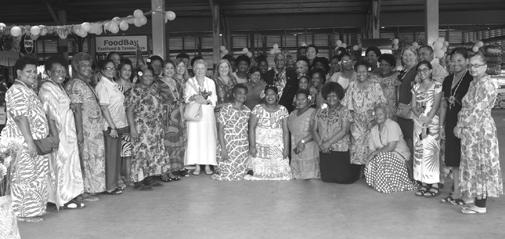

towards as an attempt to get the world on the same page around some of those things undermining the future of humanity.” They range from Zero Hunger to Partnerships for the Goals. SDG5 is Gender Equality, which includes eliminating violence against women; something Simone is passionate about. She is seeking the “whys” of domestic violence, believing “if we can focus on how to get at its roots, we can find a way to prevent it.”
While the goal is to have SDG5 accomplished in the next few years, UN Women estimates attaining true equality for women and girls is still 300 years away. Although that may seem disheartening, Simone doesn’t view it that way.
“We have to look at the gains. There are more women in leadership, more women earning an income that makes them financially secure, more playing a role in decision making. You can get caught up in the barriers and exclusions as opposed to saying, ‘Instead of focusing on the negatives, how can we focus on the positives? What’s the positive impact we can have and where are the gains we can make?’”
In her efforts to support and enact more gender equality throughout her native Asia Pacific region — and the world — Simone works to educate and empower by providing the tools for women to forge their own paths and build their own futures.
“It’s actually about giving them the skills they need to lead their own lives,” Simone explains. “Local women having a voice in the way they run their markets and how they run their business.”
That is where Markets for Change (M4C) comes in. Part of the UN Women’s Economic Empowerment programme, MC4 is a six-year plan that empowers women in the Pacific to gain financial independence and embrace entrepreneurship within a safe, secure, inclusive and non-discriminatory environment. It is currently focused on the marketplaces in rural and urban areas of Fiji, Solomon Islands and Vanuatu.
“One of the interventions was to create a dormitory-style building with beds and sleeping arrangements so that when female stall owners came to the markets, they were safe. This is vital because the co-dependency of personal safety with economic security go almost hand in glove. Something as simple as making sure women are safe on their way to market or while selling their produce and then able to then deposit that money so they’re not travelling back to their farms or their homes with money on them is impactful.”
Beyond enhancing physical safety, M4C empowers women economically through workshops on leadership, marketing, financial literacy, and entrepreneurship. These initiatives led to increased sales, greater representation of women in market committees, and a stronger voice in decision-making processes affecting their livelihoods.
“Markets for Change is the starting point for what support and empowerment can offer other women entrepreneurs in similar circumstances. Change begins with small gains and incremental steps,” Simone says.
Small gains and incremental steps may not seem like much considering rising violence against women and the news that accomplishing SDG5’s gender equality goal is 300 years away. There are doors opening, however, and M4C is one such door with others widening every day. Being a part of those gains keeps Simone and UN Women motivated and looking toward the horizon.
“If we only focus on how far we still have to go, then we will never get anywhere. It’s maintaining the momentum of change and the belief that change is possible — even though it’s challenging. The SDGs are within reach, and we know that achieving gender equality is key to unlocking all other SDGs. That’s what keeps us focused — and more importantly, determined to achieve equality, not simply as a goal but as a fundamental human right.”
Simone then reflects, “I wouldn’t do what I do every day if I didn’t believe it’s possible.”
Read here to discover stories about some of the amazing women entrepreneurs impacted by Markets for Change.
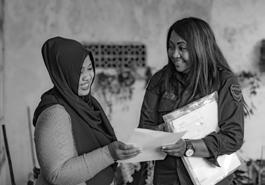

UN Women works in over 100 countries across the globe, driving transformative change to support, protect, and empower women and girls. Your donation helps break barriers, end violence, and carve pathways to opportunities for millions worldwide. Together, we can create a gender-equal world—one where every woman and girl has the chance to thrive.

Byline: Linda Morris
“The infinite power is literally in your hands.” Welcome to WeAre8 — a whole new way of engaging in social media. In this edition of Women in Business Spotlight, WeAre8 founder Zoe Kalar shares her infectious spirit and the catalyst behind the social media platform that “unites people to change the world.”
I grew up in Dandenong, Australia, a very working class suburb, during the 70’s. My mum was a nurse, my father a doctor — it was a very brutal view of the world and you had to be tough. I saw the economic pressure on people — I watched my mum at the supermarket making conscious decisions about what she bought. We did Meals on Wheels and we were about community. It was normal to look after each other. That was quite a beautiful way of growing up. Then my dad worked at the Freiberg University in Germany and it opened up the world to me.
About 8 or 9 years ago, I saw a stat from the Federal Reserve that said 37% of all Americans cannot find $400 in an emergency. Facebook makes $200-$400 per person in America and that’s the same amount of money that 37% can’t afford. Ads were benefiting the social media platforms but engaging in them wasn’t paying dividends to the suppliers of content. Users and contributors of social media were becoming the largest unpaid workforce in the world and there was a lot of toxicity with that engagement. I decided to put together a team of behavioural scientists around the ad model and I became obsessed with the algorithms. Those algorithms are literally dividing and controlling everyone. We as humanity are infinitely connected and we are not feeling that connection, or that value and power in ourselves. Big tech controls what we see, what we feel, what we do. We were headed for disaster and I saw the future if we didn’t just start redesigning and architecting. And here we are 8 years and $15 million later.


Do we need another social network like the old one? Absolutely not. Do we need a social network that inspires, entertains, builds real communication and connection, and values us economically by giving us economic empowerment and true creative freedom? Yes! What we’ve built is a reimagined ad model that is valued. Everyone wants to watch an ad on WeAre8. We have more power than we imagine. And that is really at the heart of 8. Infinite power is in your hands.
It is an ecosystem. We have three feeds: Our top 8, where we are doing 8 stage takeovers curated by all sorts of amazing creators, where you can Discover without algorithms or ad interruptions. The middle feed is Following — everyone I’m following including my friends. And just this past month, we launched Flows, which is like a retro Twitter without the toxicity where you can jump into the flow of the best conversation on science, UFOs, whatever you like… Our framework turns WeAre8 users into the biggest media companies in the world. When you unlock the people from the control and shackles of algorithms, and give them freedom to take people back to their websites, you unlock the economics — we share 60% of the ad money with people — and that unlocks access to the economy.
I think entrepreneurship chooses you. You don’t really choose it. I’ve been prepping to do what I’m doing right now for 35 years and I think you have to be insane as a woman to start a business because the odds are against you from the beginning. One of the reasons I want to build the biggest platform in the world to make everyone safe, to create the whole economy, is really to reframe how the world sees women. It is one of the reasons I love F5. They give women space to have big visions and that doesn’t exist in normal VC.
We’ve created a whole new framework with reimagined social experience, no ad interruption, no toxicity, and a whole new economy powered by the people. Social media should be powered by the
people where we can just be free and love each other again. What we’ve built is exciting because it’s big and changing the tech paradigm. It’s about healthy sustainable economics. In 12 months time, we won’t know ourselves. I feel that hopeful. We have a big campaign in the US just after the election that goes all over the country. Regardless of the outcome, I feel people are going to need hope, inspiration, and economic empowerment.
My husband inspires me. My 3 boys inspire me. My team inspires me everyday because they are so clever and we all push each other in the most healthy way. I find inspiration honestly everywhere. I get inspired by the true stories of the people.
What advice do you have for other female founders?
First I’d say more power to you. I’m here for you. Be as zipped up as you possibly can and be prepared to put it all on the line. I’m with you. You have to believe in yourself and question the way you’re doing things. Entrepreneurship chooses you. Put the right people around you if you can.
I was born Sue Maynard but I never wanted to be called “Sue.” My mom always called me “Zoe,” which means “life” in Greek. I was changing my last name to “Kalar” and I decided I wanted to be called Zoe Kalar. It feels like me. Names define us. Too often we sit in situations we don’t like, feeling stuck, and we don’t change them.
We have only one wild and precious life to live, so let’s be our truest selves as much as possible.
UPDATE: Big news for Weare8! On 22 November, it was announced that Project Liberty and Frequency Network Foundation are partnering with Zoe and Weare8 to “transform social media together through the Frequency blockchain, empowering people with ownership, transparency, and a healthier digital experience.” This is a very exciting collaboration that expands the transformation of social media to become an even more equitable and supportive platform for the community of creators, makers, and users.
Check out the whole story on this incredible “social revolution,” and click here to experience all that WeAre8 has to offer and learn more about Zoe Kalar and her purpose-driven work.
Byline: Linda Morris

F5’s Platform and Community Lead, Georgia Marshall, shares her experiences attending a once-in-a lifetime conference in a unique and oft overlooked South Asian nation
Emphasising wellbeing over material wealth is just one of the things that makes it special. With a population of 800,000 and a similar size to Belgium, Bhutan is a country that flies under the radar. People tend to know very little about it, but as soon as they learn more, feel compelled to visit.
This was me. Earlier this year, I happened to be at a co-working community in New York and find out that Bhutan would be hosting the biggest international conference in its history, The Bhutan Innovation Forum. I was immediately sold and curated all my plans so that I could be there.
For extra context about my background, and why I made this entirely impulsive life choice, I had just spent a whole year leading up to this serendipitous moment visiting communities and ‘designing my life’ around the world. What does this mean? Applying design principles to my life and consciously researching and testing how I do (and don’t) want to live.
Many of my teenage years and 20s were spent trying to follow specific narratives and expectations. But just before I turned 30, I was inspired by this book, and decided to take up every opportunity to meet all kinds of people, throw myself into different contexts, ask a lot of questions, and carve out a life that is authentically me and full of purpose (even if slightly unconventional!). I also happen to be fascinated by all things social impact and run a community for people who want to do more good in the world, called Humans For Good.
So, as soon as I heard about this opportunity to listen and learn from this little-known, carbon-negative country, I shipped it and booked a flight. I ended up flying from Mexico to Bhutan, and spent three days talking about entrepreneurship, sustainability, and the launch of Gelephu – the world’s first mindfulness city, with 1200 global and Bhutanese business, social impact and spiritual leaders (including the king and queen of Bhutan). I then spent a week exploring the country, and getting to know what makes it so unique and worth visiting once in a lifetime.
It turns out that there is so much for not only me, but all of us to learn from this tiny country. Below are just a few of many examples.
Bhutan is carbon negative, with an abundance of natural beauty and more than 70% forest cover (in their constitution, this should never be less than 60%). There is an understanding that we happen to be human beings, and everything we do affects the many other beings that live on this planet. Bhutan’s biological corridors protect animal movement during breeding and migration, and its source of energy is clean and renewable hydropower, which they are able to export to neighbouring countries. Bhutan has also established a comprehensive legal framework that ensures economic activities do not compromise environmental integrity. For example –regulations are in place so that buildings are designed in a way that is environmentally friendly, and promotes their traditional architecture. And Bhutan requires tourists to pay a daily Sustainable Development Fee and hire tour guides, which encourages environmental conservation and community development.
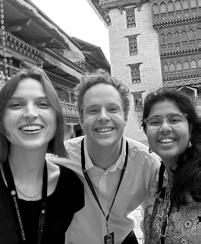
FUN FACT: BHUTAN IS THE ONLY COUNTRY THAT MEASURES SUCCESS NOT BY ITS GDP, BUT ITS GROSS NATIONAL HAPPINESS.

I was extremely fortunate to tour a local high school – the Educating for Lifelong Citizenship School. Every hour, a gong sounds and both students and teachers meditate for one minute. Every day, students are encouraged to share the feelings that they are experiencing, and taught healthy ways to manage them (all emotions are welcome, but all behaviours are not). There are support circles available at the school for both teachers and parents, as well as restorative justice circles that focus on reconciliation rather than assigning blame – and creating safe spaces for students when conflicts arise. Students are asked to show compassion for self and others at all times, and there is a ‘report and support’ system in place to help those who are bullying others. Much more info about ELH High School, here!
The king and queen are loved and known for actively engaging with citizens and prioritising their welfare. On his 40th birthday, King Jigme requested that citizens either plant a tree, adopt a stray animal, or clean up their neighbourhoods as a tribute to him (over 108,000 trees have been planted over the years). During the forum, the queen sat and drank tea with us, and even contributed when we (for reasons I can’t remember) started talking about Burning Man. During an unofficial dinner that participants organised at the forum, the king popped by to say hello, organised a cake and someone to sing a traditional song, and gave everyone gift baskets. He also said a few impromptu and inspiring words:
“At the end of the day, the outcome of anything depends on the people who take it forward, carry it forward, shoulder that responsibility. So I’m just trying to be a good king, but I have amazing citizens. Everything else is being done by other people.”
Bhutan’s Gross National Happiness (GNH) Index basically measures the collective happiness and well-being of the Bhutanese population. It’s structured to capture different aspects of life, including psychological wellbeing, health, education, cultural diversity, community engagement, ecological resilience and living standards, and allows policymakers to design strategies that address the root causes of unhappiness. The GNH is rooted in Buddhist teachings and philosophies, and acknowledges the spiritual and emotional dimensions of collective happiness. I saw this play out in practice while in Bhutan, and noticed a big focus on mindfully listening to and honouring (not judging) our emotions, our intuition and our bodies. I also visited the National Traditional Medicine Hospital, which offers natural treatments and medicines like herbal baths, steam rooms, hot compression and acupuncture, and works side-by-side with the modern medicine hospital.

Finally, rooted in the concept of Gross National Happiness is an emphasis on civic responsibility and democratic participation. Just one of their community initiatives is the “Orange Army,” which consists of nearly 49 000 volunteers – all actively contributing toward development projects and community work. Bhutan focuses on collaborative decision-making, and brings together diverse stakeholders to plan for their future. This community spirit extends to women’s empowerment initiatives, where women are actively encouraged to participate in governance and local decision-making processes.
All in all, Bhutan is a very special place. I feel lucky to have experienced it while it is relatively untouched by the outside world. There are so many weird and wonderful ways to live and do good in the world (link to newsletter), and there is a lot that we can learn from Bhutan’s unconventional approach to a number of issues. For me personally, this experience was also a great reminder to stay optimistic about the future, and continue designing a life of impact and purpose.
If you are curious about Bhutan and interested in joining their forum next year, or getting involved in Gelephu (their mindfulness city that will be home to 1 million people from different countries), please don’t hesitate to reach out to me at georgia@humansforgood.co
Here are a few favourite resources for learning more:
• ELC High School: The Contentment Foundation in Bhutan
• Bhutan’s Department of Tourism website (for general info and Q&A on travelling Bhutan)
• Kuensel, Bhutan’s national newspaper
• Druk Journal, Bhutan’s journal of thought and ideas (started by the Bhutan Centre for Media and Democracy)
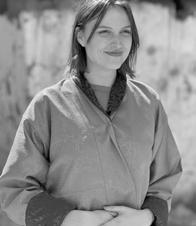
Bhutan blends cultural values, royal support, and community-based strategies in its efforts to advance women’s rights.
Bhutan integrates gender equality and women’s empowerment as critical components of its Gross National Happiness. Gender issues are considered in all aspects of policy-making, and societal progress.
• Bhutan’s approach to women’s empowerment often incorporates traditional Bhutanese values and cultural context – making its initiatives more culturally relevant for its citizens.
Royal support brings more credibility and visibility to women’s issues, along with cultural legitimacy and an increased impact nationwide. For example, RENEW (Respect, Educate, Nurture, Empower Women) was founded by Her Majesty the Queen of Bhutan and provides case management, psychosocial support, safe spaces, and skills training for survivors of sexual violence across ten Community Service Centres
• Bhutan has a community-driven approach to women’s empowerment, and actively fosters grassroots involvement and a trained network of youth volunteers in organisations like RENEW
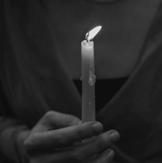
By the time you finish reading this article, somewhere in the world, a woman will have been violently murdered— by someone she knows and trusts. This grim reality is not just a statistic, it’s a stark reminder of a global crisis that demands our immediate attention. Every ten minutes, a woman is violently murdered. Imagine that: six women every hour, 144 women every day. These are not just numbers, they are mothers, daughters, sisters, and friends whose lives have been tragically cut short.
In Australia, where I write this article from, the reality is equally alarming. This year alone, we have witnessed a surge in intimate partner homicides, nearly doubling the number of women killed compared to last year’s figures. The names and faces of these women flash briefly in the news cycle, only to be replaced by the next tragic story. We have become accustomed to the weekly, if not sometimes daily, deaths of women—an unsettling normalisation of violence that should horrify us all.
Globally, the numbers are staggering. Last year, 18,000 women in the Asia-Pacific region lost their lives to femicide. In Africa, the number was even higher at 27,100. The Americas saw 8,300 women killed, and Europe 2,300.
Disturbingly, we lack comprehensive statistics for women in the Middle East, highlighting gaps in reporting and recognition. All of this violence committed at the hands of men who purported to love them.

As we observe the United Nations’ 16 Days of Activism Against Gender-Based Violence, which runs until 10 December, we are starkly reminded that gender-based violence is a pervasive issue that transcends borders, cultures, and socio-economic status. Whether or not it is making headlines, it is happening every minute of every day. This is not new news, but it is news that we must stop ignoring.
Many will agree that one woman’s death is too many. Each time a woman dies at the hands of a man she trusted, there is a collective sense of horror and distress among communities worldwide. When such violence occurs in public spaces, the outcry is louder and calls for action intensify—as they should. Yet, mere days later, that outrage often dissipates, overshadowed by other events, and the cycle and rituals of daily life press on.
Beyond the violence itself, what deeply troubles me is the unsettling acceptance that seems to permeate our global society— that a certain level of violence against women is tolerable.
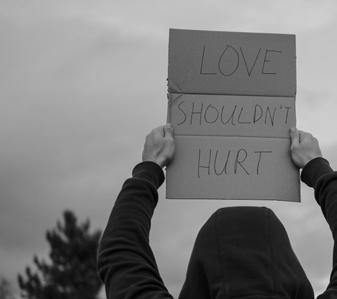
It is as if there is an unspoken agreement that women will continue to be harmed simply for being women and loving people who feel entitled to exert control through violence. Despite increased global discourse on gender equality and women’s safety, complacency in the face of ongoing violence sustains a status quo that needs to be challenged.
Acknowledging this reality is difficult. In an era where harmful ideologies can spread rapidly through extremist misogyny propagated online by figures who targets insecure men and boys to weaponise patriarchal ideologies that silence and undermine women’s voices or demonise men and boys who don’t fit the stereotypes of hypermasculinity. A rise in organised groups who view women’s empowerment as a threat to social order, often advocating for the protection of ‘traditional’ values while running an agenda of rigid gender roles that limit women’s economic participation and commit them to servitude and unpaid labour. Through rhetoric like “your body, my choice” and the global assault on women’s reproductive rights, we are reminded daily of our place, and the growing backlash that exists against women who speak out.
In my twenty years of feminist work, I have always felt an eerie and ever-present truth that we often avoid confronting. It is as though there is an unspoken agreement or social pact that some amount of men’s violence against women is tolerated. If it were truly intolerable, we would have taken more decisive action to eradicate it by now.
We need to confront this uncomfortable reality: our society’s lack of decisive action against gender-based violence illuminates a deeper, unsettling acceptance of the status quo. This demands our attention and compels us to examine the root causes of violence—power imbalances, rigid gender roles, and systemic
inequalities that perpetuate gender-based violence.
Consider the countless stories behind the statistics. Women like Hannah Clarke, who, along with her three children, was tragically killed by her estranged husband in Australia. Or the women in India who face acid attacks for rejecting marriage proposals. These are not isolated incidents but part of a broader pattern of violence fuelled by control and entitlement.
The frequency of these incidents is alarming, and yet society seems to accept them as part of the backdrop of daily life. Each statistic represents a life lost, a family shattered, and a community impacted. The normalisation of such violence raises critical questions: How many more women must suffer before decisive action is taken? At what point do the numbers become unacceptable? The truth is, even one life lost is one too many.
Global research consistently shows that gender inequality is a fundamental driver of violence against women. Societal norms that condone or excuse abusive behaviour, rigid gender roles, and power imbalances create an environment where violence can thrive. Stereotypes that emphasise dominance and control, along with societal acceptance of aggression, limit women’s participation and decision-making all contribute to the conditions that perpetuate violence-supportive attitudes. Addressing these root causes is essential if we are to make meaningful progress.
So why aren’t we fixing this horrific problem? Preventing violence against women on a global scale requires challenging the status quo and making significant changes in how we operate as societies. Those holding influence may not feel the urgency to change, may not fully understand the extent of the problem, or may be uncertain about how to take effective action or use their field of impact. Sometimes, fear of change or disrupting
established norms can hinder progress. Yet, meaningful change often requires us to step out of our comfort zones and address difficult issues head-on.
But what does that comfort actually mean? For men, it often means not having to question long-held privileges or confront uncomfortable truths about masculinity and power. It means maintaining systems that favour them in workplaces, politics, and social settings. For society, this comfort manifests as resistance to change, clinging to traditional norms that perpetuate inequality and suppress progress. It’s the ease of not having to disrupt existing power structures, privileges, or rights, even when they are fundamentally unjust.
However, maintaining the status quo doesn’t just harm women, it affects all of us. By upholding rigid expectations and limiting opportunities, we hinder our collective potential for growth and well-being. For men, rigid or narrow definitions of masculinity can lead to pressures that negatively impact mental health and personal relationships. A more equitable world benefits everyone by fostering healthier, more authentic interactions and societies. We read headlines about another woman killed by a partner, another life lost to gender-based violence, and yet the societal response often lacks sustained momentum. The normalisation of violence suggests a threshold of women we are willing to lose year after year to uphold the status quo. We are at a point where we’ve accepted as normal that an entity called Counting Dead Women needs to exist. Data is essential, and whether we should be collecting it is not the question. But are we okay with the fact that women’s deaths due to men’s violence need to be counted and updated so frequently? Each statistic is a person—a life with dreams, relationships, and contributions to make.
Let’s remember, too, that these numbers don’t include women who die due to inadequate healthcare, personal protective equipment that doesn’t fit properly, vehicles that aren’t designed with women in mind, natural disasters whose recovery efforts don’t centre the needs of women, or any of the other sly but serious ways that women’s lives are cut short by gender inequality.
A common argument is that there’s a lack of sufficient funding and resources to tackle violence against women effectively. While resources are crucial, and I see Governments around the world doing more and more, this argument often obscures a deeper, more profound issue: societal willingness to accept a certain level of violence against women—as if it’s an inevitable aspect of human nature. This acceptance reflects a failure and sticking point that we must address if we are to create meaningful change.
We must directly ask: What is the value of a woman’s life? If we accept any level of violence or loss among women at the hands of men, we are implicitly suggesting their lives are less valuable. If we truly believe in equality, we must do more to reject that notion and create a safer world for everyone. We must challenge the societal norms that devalue women’s lives, demean their ambitions, curtail their freedoms, and ultimately perpetuate conditions that allow violence to occur.
For as long as I’ve worked in the gender equality field, my approach has been to take and encourage action, through policy change, systems reform, shifting cultural norms, and lots of

WE MUST DIRECTLY ASK: WHAT IS THE VALUE OF A WOMAN’S LIFE?
smaller steps in between. So long as there is action for women, that is what matters. As a gender equality expert and woman navigating the world each day, I am deeply concerned about solutions.
Fortunately, we are not without solutions. Leading practices from around the world demonstrate that comprehensive approaches can make a significant difference. These include implementing gender-sensitive education curricula that challenge stereotypes from an early age, promoting policies that support women’s economic empowerment, enforcing laws that protect women from violence, and investing in programs that engage men and boys as allies in gender equality. Innovative interventions, such as bystander programs and community-led initiatives, have shown promise in shifting cultural norms and reducing violence. Business leaders are implementing equitable workplace policies, fostering inclusive cultures that challenge harmful gender norms, and supporting initiatives that empower women and educate employees on respectful relationships. We have the tools and knowledge, what is required is the collective will to implement them. By highlighting collaborative efforts and progress, we can inspire others to join the cause and contribute to positive change.
Suggesting solutions, though, is not the main intention of sharing these reflections. Because we already have many of the answers we need. Feminists have been giving them to us for years. Until we confront the harrowing truth that some level of violence against women appears to be acceptable, these answers won’t get us far. So instead of practical solutions, these words are intended to create space, albeit an uncomfortable one, for us to sit with the complex and unpleasant reality.
Some may contend that we already reject violence against women, citing existing laws and policies. However, our actions, systems, customs, and cultures often tell a different story, and that story differs for women around the world. The persistence of victim-blaming, underfunded support services, leniency toward perpetrators, and pervasive stereotypes in media and everyday interactions indicate that we have not fully committed to eradicating this issue. It’s not enough to denounce violence in words, we must reflect our condemnation through tangible actions and systemic changes.
When will we refuse to accept any level of intimate partner violence and death—no matter a person’s gender, race, religion, ethnicity, sexuality, or ability—as tolerable? Now is the time. Our actions must align with our stated values. Our systems, customs, institutions, and cultures must reflect our commitment to promoting equality and eradicating violence.
Each of us has a role to play in challenging and dismantling the systems that allow gender-based violence to persist. Whether it’s in our businesses, workplaces, communities, or personal relationships, we can advocate for change, educate ourselves and others, and support initiatives that promote equality and safety.
To those who might be hesitant about change, I assure you that gender equality benefits everyone. The intention of challenging the status quo is to create a better world for us all. Embracing this truth, and partnering with experts and advocates who are ready to support you, is the next step toward building a fair society where everyone is safe and has the opportunity to thrive.

I invite business leaders, policymakers, community members, and individuals to join me in this crucial work. Together, we can develop strategies, implement policies, and create cultures that protect and empower women, ultimately benefiting everyone. By engaging in open dialogue, acknowledging diverse perspectives, and embracing change, we can build a future where every woman lives free from the threat of violence.
Another ten minutes, another woman’s life has been taken. This is not a distant problem—it’s a crisis that touches us all. So, I leave you with these questions: How can we take this issue more seriously? What are you doing for the women today?
The time for complacency has passed. The responsibility lies with each of us to challenge the status quo, to demand better, and to act. Let us envision a world where gender equality is not just an aspiration but a reality—a world where every woman can live without fear, where women and men stand as equals, and where societies thrive on the contributions of all their members. This is not an unattainable dream but a future within our grasp if we choose to make it so.
Byline: Chantelle Stratford PSM Image Credits: Maria Loznevaya, Anete Lusina, Nahmad Hassan

As we reflect on 2024, it’s clear this has been a year of growth, bold moves, and incredible strides to empower women globally. From launching new initiatives to forging powerful alliances, this year has set the stage for 2025 to be a landmark for F5, with our mission taking centre stage: Generational Change for Women.
At the start of this year, I had the privilege of stepping into my role at F5, aware that I was joining a revolutionary organisation but unaware of how incredible it would be. The energy was palpabledriven by our CEO, Tracey, who had been steering the ship for a few years. We often describe F5 as “the little mouse that roared,” but trust me that is a direct result of Tracey’s dedication and hard work. It’s been an honour to work alongside her these past 12 months, thank you Trace.
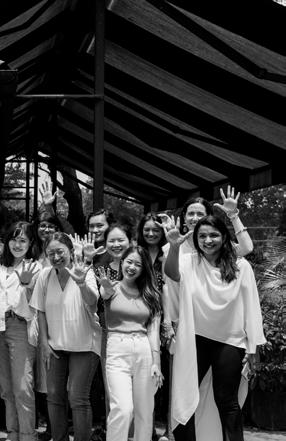
I FEEL INCREDIBLY FORTUNATE TO BE PART OF OUR MISSION TO CREATE GENERATIONAL CHANGE FOR WOMEN. THIS MISSION GUIDES OUR EVERY DECISION, EVERY DAY. FROM SYDNEY TO SINGAPORE, AND FROM CORPORATE BOARDROOMS TO GLOBAL CONFERENCES, F5 HAS CHAMPIONED A NEW NARRATIVE: ONE WHERE WOMEN AREN’T JUST PARTICIPANTS - THEY’RE LEADING THE CHARGE.

In March, we took our vision to Asia, visiting Hong Kong and Singapore. In Hong Kong, we sponsored a global female founders event that aligns with our mission of lifting women. We also had the privilege of engaging with high-net-worth individuals, founders, and investors. We sat under the hot Singapore sun (sorry all!), sharing our plans with an incredible group of female founders, encouraging them to keep building despite the challenges women often face. The feedback was extraordinary - solidifying that F5 is not just another fund but a movement. These connections are paving the way for future collaborations and growth in the region.

Throughout the year, we’ve been vocal in calling out the entrenched barriers women face in the entrepreneurial ecosystem. The system wasn’t built for them - and we’re changing that. From corporate events to SXSW, our team has relentlessly driven home the message: women deserve better access to capital, resources, and opportunities, and F5 is delivering real, systemic solutions. We also updated our Theory of Change to reflect new learnings, further cementing our leadership in the fight for gender equity.
In the middle of the year, I was fortunate to meet Kelly (F5 Chairman and Founding Partner) and Carla Kimball in person. I can’t express enough how inspiring these two individuals are,
and how dedicated they are to the F5 mission. Their unwavering support makes what we do possible, and it was such a treat to spend time together in California - an experience I’ll always cherish.
While in the US, the Founding Partners of F5 received an award for their role in passing SB54 on the Senate floor in Sacramento. This monumental achievement was a powerful acknowledgment of F5’s commitment to creating long-lasting, impactful solutions for women.
One of our core values at F5 is boldness. With that in mind, we launched the F5 Magazine - what you’re reading now! This quarterly digital publication amplifies the voices of empowered women across the globe, showcasing real, authentic, and often challenging journeys. It’s quickly become a trusted source of truth, inspiration, and insight. If you have a story to share, please contribute via the link in the contents section!
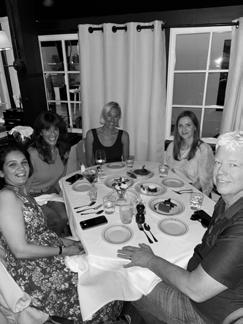
2024 was a year of expansion for F5, cementing us as a truly global organisation. We welcomed Holly Richards to lead Marketing and Georgia Marshall to head our digital platform. We also brought on Linda Morris as Creative Director in LA and Divya Reddy in New York to support operations. Their expertise has been instrumental in developing the F5 Empowered Women Ecosystem which will launch next year. This ecosystem will be a game-changer, offering women personalised learning journeys, financial tools, and a global community of like-minded leaders and innovators. Watch this space!!!
We’re thrilled to report that all companies in our Fund 1 portfolio have shown promising growth. Despite a challenging market, our portfolio companies have demonstrated resilience. As an example, Telecare, one of our standout investments, saw a 68% revenue increase this year alone - showcasing how F5 is committed to driving real change.
One of the most exciting developments this year has been our engagement with women’s sporting codes, thanks to our partner and friend, Lev Shevki. Like Lev, we believe that empowering women extends beyond business and into sports. Female athletes face unique challenges, including poor pay, and F5 is stepping up to support them, creating pathways to secure their futures beyond the playing field. This is just the beginning of our work to champion women across all sectors, and we look forward to announcing unique partnerships in 2025.
As we look toward 2025, our vision is clearer than ever. We envision a world where women no longer conform to systems not built for them. We’re building systems that elevate and embrace the ambition, creativity, and strength of women.
The F5 Empowered Women Ecosystem, launching in March, will be at the forefront of this transformation. This platform will provide women with the financial tools, learning resources, and peer to peer support needed to create generational impact. Alongside the Ecosystem, we’ll launch our Foundation and Feesfor-Good strategy. We’ve never felt more supercharged than we do right now!
At F5, we believe in the limitless potential of women. Our mission is bold, our voice unapologetically honest, and our commitment unwavering. 2025 will be a year to remember as we continue to build a future where women thrive and reshape the landscape of success.
We invite you to come on the journey with us. To lean in and to make change. Together we WILL empower women globally.